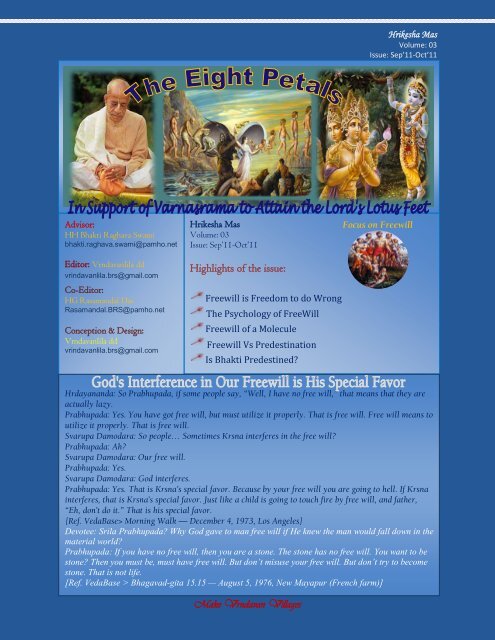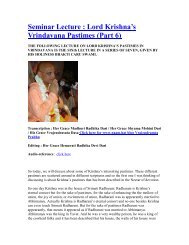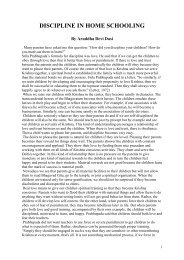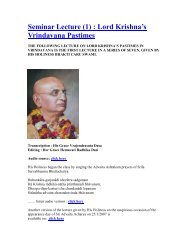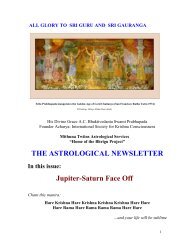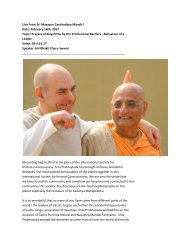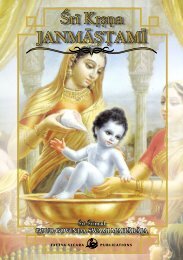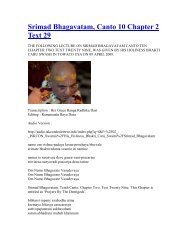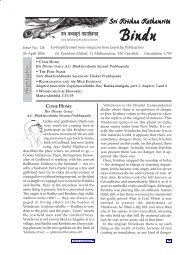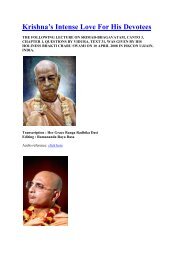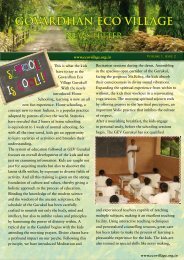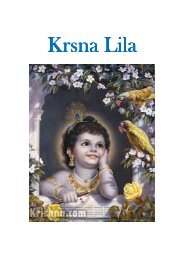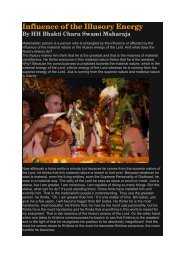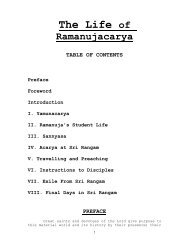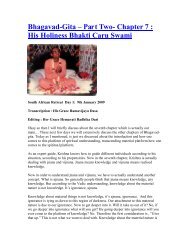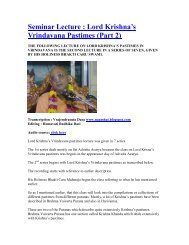Hrsikesa Masa Vol-03 - The Eight Petals - ebooks - ISKCON desire ...
Hrsikesa Masa Vol-03 - The Eight Petals - ebooks - ISKCON desire ...
Hrsikesa Masa Vol-03 - The Eight Petals - ebooks - ISKCON desire ...
Create successful ePaper yourself
Turn your PDF publications into a flip-book with our unique Google optimized e-Paper software.
Hrikesha Mas<strong>Vol</strong>ume: <strong>03</strong>Issue: Sep’11-Oct’11Swedish man (3): Is there free will?Prabhupada: Yes, yes. Just like you are sitting here. If you don’t like, you can goaway. That’s your free will. <strong>The</strong>re is free will. Because we are part and parcel ofGod, God is completely free to do anything.And because we are part and parcel of God,therefore we have got minute quantity offreedom. Just like a drop of ocean water, it isalso salty, but the quantity of salt in that dropis not equal to the salt in the ocean. Similarly,you have got a little quantity of freedom, butnot as freedom as God has got. That is notpossible. You are subordinate. Your freedom issubordinate to God’s freedom. <strong>The</strong>refore ifyou misuse your freedom, then you becomepunishable. <strong>The</strong> government gives youfreedom, but if you misuse your freedom, ifyou violate the laws, then you are criminal.Yes? [Ref. VedaBase > Bhagavad-gita 7.1-3 — Stockholm, September 10, 1973]***Prabhupada: Free will means…Hayagriva: …infallible judgment?Prabhupada: Free will means that you can act wrongly. That is free will. Unlessthere is chance of doing wrong or right, there is no question of free will. Where isfree will then? If I act only one sided, that means I have no free will. Because weact sometimes wrongly, that means free will.Hayagriva: A man may know better but still act wrongly.Prabhupada: Yes.…Prabhupada: But that is free will. He misuses his. Just like a thief, he knowsthat his stealing, it is bad, but still he does it. That is free will. He cannot check hisgreediness, so in spite of his knowing that he is doing wrong thing — he will bepunished, he knows; he has seen another thief, he was punished, he was put intoprison — everything he knows, but still he steals. Why? Misuse of free will.Unless there is misuse of free will, there is no question of free will.[Ref. VedaBase > Rene Descartes]Make Vrndavan Villages
Hrikesha Mas<strong>Vol</strong>ume: <strong>03</strong>Issue: Sep’11-Oct’11to feel and to will. <strong>The</strong> intelligence has two functions, namely to accept or reject. As longas one remains on the platform of “false ego” (ahankara), the intelligence accepting theself to be this gross and subtle body, keeps one’s free will compromised. This “power ofdiscrimination” of the intelligence is the special feature of one who is fortunate to acquirea human form of life. Misuse of such discrimination prolongs one’s existence in thematerial world through the repeated cycle of birth and death known as the wheel of“samsara”. As long as one continues to nurture material thoughts and material <strong>desire</strong>s,these have to be enacted through a material gross body and a material subtle body. Whenone dies, one only leaves the gross body but continues to live both within the subtle andspiritual body, thus being forced to reincarnate, continuing to compromise his free will.<strong>The</strong> Free Will of the Conditioned SoulBy “conditioned soul” (baddha jiva) we mean someone who is “governed” by the threemodes of material nature called as “guna”. “Gunas” are described as the binding ropes of“karmic reaction” in keeping with the laws of material action and material reaction(karma). <strong>The</strong> root cause of “karma” lies within the “ahankara” or false bodilyidentification of the conditioned soul. In such a state, the conditioned soul is forced torepeatedly accept a material body, both gross and subtle, and is forced to follow the dictatesof the law of karma. In such a condition, one’s freedom and one’s free will is checked orconditioned.<strong>The</strong> Free Will of the Liberated SoulBy “liberated soul” (mukta jiva) we mean someone who is freed from the dictates of themodes of material nature. One exists in his natural condition of spirit soul or “paraprakriti”.As “para-prakriti”, the spirit soul who is freed from the material existenceexperiences full freedom to act on the platform of spirit soul. By constitutional position,however, one eternally remains with limited independence being the part and parcel of theSupreme Lord (Bg. 15.7). At that stage, one can express and experience puretranscendental <strong>desire</strong>s to serve the Lord and to experience fully his natural qualities of “sat,chit, and ananda”, eternality, knowledge and happiness. One’s only <strong>desire</strong> is to satisfy thewill of the Supreme Lord. <strong>The</strong> highest perfection of life is described “samsiddhir haritosanam”,pleasing the Supreme Personality of Godhead, Hari. (SB 1.2.13)Atah pumbhir dvija-srestha varnasrama-vibhagasahSvanustitasya dharmasya samsiddhir hari-tosanam[O best among the twice-born, it is therefore concluded that the highest perfectionone can achieve by discharging the duties prescribed for one's own occupationaccording to caste divisions and orders of life is to please the Personality of Godhead.]Real freedom and real free will of the living entity come only when one becomes freedfrom the shackles of this material body and regains one’s constitutional position as eternalservant of the Lord. “Jivera svarupa haya Krishna nitya dasa”: [Cc. Madhya 20.108] “everyindividual soul is eternally a servitor”. <strong>The</strong> easiest method to achieve this exalted position isto take shelter of the Lord by chanting his holy names: Hare Krishna Hare Krishna KrishnaKrishna Hare Hare, Hare Rama Hare Rama Rama Rama Hare Hare.Make Vrndavan Villages
Hrikesha Mas<strong>Vol</strong>ume: <strong>03</strong>Issue: Sep’11-Oct’11few scientists (for instance Nobel Laureate Gerard who gave a theory suggestingpredetermined status of behavior of particles and thus ourselves) who believe in nonexistenceof freewill and claim that they can predict each and every move of every studiedindividual with greatest accuracy* 2 . <strong>The</strong>ir perception reduces one to mere robots withoutany emotions and free will. A few non-atheists also find it confusing to see freewill in theface of the Lord being considered as “sarva kärëa kärëam” (the cause of all causes - BS5.1). Let us try to study it.However before I try to do so, I consider it important to confess that I am neither aphilosopher, nor a spiritualist nor even a scientist. I am a mere practicing devotee whohad been struggling to understand it till some time ago. Freewill can be compared to freeperiods that we had in our student days. As a child in the school, every class was givenone or two free periods besides other regular periods for teaching Maths, Science, English,Hindi or other such subjects. In the free periods the students were free to do anything,they could play, draw, study, sleep, read in the library or anything that theywanted to do. Though this was a free period and one was free to pursuetheir interests, yet at the same time it entailed a few implicitunderstandings:- <strong>The</strong> duration of free period and its very presence is becausethe authorities have gracefully chosen to give us so- It has to be exercised within the restrains of rules of the schooland of general decorum- Free period can be used according to one’s temperament, it can be used or evenabusedFree will is no different. It does exist and comes in measures as given by the Lord. If Hedoes not wish to give us free will and freedom to exercise it, there is no possibility of wehaving it.Swedish man (3): Is there free will?Prabhupäda: Yes, yes. Just like you are sitting here. If you don’t like, you can goaway. That’s your free will. <strong>The</strong>re is free will.Free will exists, but how much? –Only as much as the Lord wants us to have. <strong>The</strong>conversation between Çréla Prabhupäda and Çyämasundara prabhu is worth reading:Çyämasundara: Does the hydrogen molecule have an independent <strong>desire</strong>?Prabhupäda: No, but within the hydrogen atom, there is Kåñëa; therefore it iscombining. Not this hydrogen atom as matter is combining, but because Kåñëa iswithin that hydrogen atom existing. He knows that by combination this thing willcome about, that will come out, that will come out...Çyämasundara: But the individual soul has a little independence to choose?* 2 New Scientist, 4 May 2006, pp. 8.Make Vrndavan Villages
Prabhupäda: No, no.Çyämasundara: Has no independence?Hrikesha Mas<strong>Vol</strong>ume: <strong>03</strong>Issue: Sep’11-Oct’11Prabhupäda: No. <strong>The</strong> individual soul does not. In Bhagavad-géta it says thatanumantä, individual soul, wants to do something and Kåñëa gives orders. Manproposes and God disposes.Çyämasundara: So we have no free will?Prabhupäda: No. Without sanction of Kåñëa we cannot do anything. <strong>The</strong>reforeHe is the ultimate cause.Çyämasundara: But I thought you had been saying that we have a littleindependence.Prabhupäda: That independence that Kåñëa wants me to do something but I wantto deny it. But unless Kåñëa sanctions, you cannot do that also.… So far as we get information, our knowledge is from the Vedic information,aëòäntara-stha paramāëu: Kåñëa is within, the Paramātmā. It does not say the soulis within, the Paramātmā.So, how much control do we have over our free will? — We have only as much freeperiod (free will) as much as the school authorities (the Supreme Lord) will allow orsanction. Even within the allowable limits, when we exercise it, we need to follow the lawof the school (nature). One cannot violate them. Misuse of free period or abuse of freewillis followed by misery of punishment by the respective executive and judiciary authorities.Devotee (4): Prabhupäda, we're in this material world, in thishuman body, we're having to work with this intelligence, withmind, material things. So there is a group of philosophers that saythat actually because we're a product, our mind, the way we'rethinking now is a product of our upbringing and our past, thatactually we have no free will, but we're forced to think and act in acertain way.Prabhupäda: <strong>The</strong>n that you have to admit that you are conditionedby some authority. When you are put into jail, you cannot actindependently. You have to act according to the jailsuperintendent's order.… Devotee (4): So he admits he's conditioned, but still, there'sno free will. He says, "Yeah, so I'm in the prison. I'm imprisoned. I'm conditioned."Prabhupäda: No, no, no. Free will... Just like a man commits theft by his free will.But when he is put into jail, then no more free will. He has to act according to thejail superintendent. But his beginning of jail life is free will. Nobody asked himthat "You go to jail." But why he has come? He knows also that "When I am putinto jail, I will lose all my freedom." He knows that. Still, he comes. Why does hecome? He knows that. That is called ajnana. Mudha. That is called mudha. HeMake Vrndavan Villages
Hrikesha Mas<strong>Vol</strong>ume: <strong>03</strong>Issue: Sep’11-Oct’11knows; still, he does. [Ref. VedaBase> Morning Walk - 14 July 14, 1975,Philadelphia]<strong>The</strong>re is another discussion reinforcing the same thought:Prabhupäda: Yes, freedom. Our present condition is not freedom. We arecompletely under the laws, te 'pi svatantra rudhäëé vardhya (?). <strong>The</strong>y are tied up bythe ropes of material nature, hands and legs, and still they are thinking, “I amfree.” That is illusion. Nobody is free. Daivé hy eñā guëa-mayé mama mäyäduratyayä [Bg. 7.14]. We are seeking freedom but nobody is free. Nobody is free.Prakåteh kriyamäëäni [Bg. 3.27], they are pulled by the ear, “Do this.” Prakåteh.You have to do this.Çyämasundara: He says that the free will, which creates itself or realizes itself isthe truest of all realities.Prabhupäda: Yes. So if by free will if you choose to surrender to Kåñëa then you'llget your real free will, freedom. Otherwise you are under the clutches of mäyä.Daivéhy eñä guëa-mayé mama mäyä duratyayä [Bg. 7.14]. You cannot surpass thestringent laws of material nature, that is not...So, working within the stringent laws of nature, one can misuse the gift of free will andbind himself in the vicious circle of death-birth-death. In the Bhagavad-géta (5.13) theLord says that He is not the cause of anyone's particular work, nor the authority, nor theresult of such work—but that all these come out of the various modes of nature. Thus, allacts performed by the living entity–except those with transcendental results–are self–created engagements arising from an abuse of the freewill, and therefore such acts orengagements are never to be considered as if the works and the results were somehowordained by the almighty Godhead. Such works are all material and are thereforeconditioned and directed by the modes of nature. <strong>The</strong> Personality of Godhead dissociatesHimself from such works.One cannot be without work, how can we work without getting entangled in the karmicreaction of that work? If we surrender all our actions or work to Him, we can but how dowe do it? Conditioned with the three modes of nature or guëas, how can one take theright decision? If the freewill is so dangerous, should we repress it altogether? Howshould the freewill be used that it does not prove self-injurious due to our ignorance?Though we are suffering in this material body because of our earlier misuse of free will;yet it is His causeless mercy that the Lord has not abandoned us. Keen on bringing usback to Him, even in this situation He has given us the way out, an escape route from thisprison house. He has given us free will, but He has also given the instructions to use itproperly to return to Him. Prabhupäda explained it beautifully:“I am now talking to you the most confidential words.” (Sarva-guhyatamam) “You stopyour so-called freewill. Just surrender to Me.” This is the most confidential. “If yousurrender to Me, that is good for you. But if you go on keeping your free will you'll not behappy.” <strong>The</strong>re is also free will. When you come to the platform of Kåñëa consciousnessyou serve Kåñëa with freewill, not that you become a stone. <strong>The</strong>re is freewill. Just like ourMake Vrndavan Villages
Hrikesha Mas<strong>Vol</strong>ume: <strong>03</strong>Issue: Sep’11-Oct’11devotees they are dressing Kåñëa nicely, is there no freewill? <strong>The</strong>y are cooking for Kåñëa.Is there no freewill? <strong>The</strong> freewill is there. <strong>The</strong> Mäyävädī philosopher says, the Buddhaphilosopher says, that "Stop this freewill, and then you become happy." But ourproposition is not to stop freewill but purify freewill. Purify. Not stop these eyes. Just if itis suffering from cataract, cure that cataract. Keep the eyes. And their proposition, “Getout these eyes and throw it. <strong>The</strong>n there will be no more seeing what is right and wrong.”That is their proposition. Nirviçeña-vädé. Nirviçeña means no specialty, no varieties. That isnirviçeña. And çünya, zero. When it is zero,then there is no question of right and wrong.So our philosophy is not that. <strong>The</strong>re is nozero, and there is no variety. We don't say.<strong>The</strong>re is, but its purified varieties. Tatparatvenanirmalam [Cc. Madhya 19.170].Nirmalam means purified. So our process is topurify everything.”Our job is therefore to purify our freewill andthus dovetail our freewill with His Supremewill – Easier said than done.çaà ceñöate svasyäù / prakåter jïänavän apiprakåtià yänti bhütäni / nigrahaù kià kariñyati [Bg 3.33][Even a man of knowledge acts according to his own nature, for everyone follows thenature he has acquired from the three modes. What can repression accomplish?]Repression fails and dovetailing is difficult, bordering on impossibility? How do we dothat while being puppets in the deft hands of mayadevi and her tools of three guëas? Shekeeps us in the prison house using the trident of three guëas? It is very difficult totranscend the guëas. This concern was expressed by Arjuna himself to the Lord and Heeven agreed to it, but He gave a solution to that too. Even while working within guëas,using freewill according to one’s guëas, one has the option of coming out. One needs tobe just what one is. Just perform one’s duty according to one’s nature or “svabhäva” –according to one’s varëa and guëa – or simply following the principles of daivavarëäçrama – “svabhäva-niyatam karma / kurvan näpnoti kilbisam” [Bg. 18.47]. It is worthnoting that the system of varëäçrama, has been created by Him and is thus perfect. cäturvarnyammayä srstam / a-karma-vibhägaśaù [Bg. 4.13] Simply by performing one’skarma within the varëäçrama set up ensures that our freewill is not abused.<strong>The</strong> Lord is so merciful! He has created varëäçrama for us. For the soul who has abusedthe freewill. For the soul which is just one-thousandth of the hair tip in size. Being Hiscreation to protect the erring; varëäçrama is in complete congruence with the Supremewill and is thus capable of giving one an opportunity to make the best of our human lifewithin the limitation of svabhäva and as. <strong>The</strong> set up varëäçrama ensures that one is onthe path of gradual spiritual evolution without resorting to “unnatural” methods ofachieving transcendence. Hare Kåñëa!Make Vrndavan Villages
Free Will Vs PredestinationEasily ExplainedHrikesha Mas<strong>Vol</strong>ume: <strong>03</strong>Issue: Sep’11-Oct’11M- HG Kesava Krsna Dasaany times devotees try to reconcile this essentially Christian concept with Vedicunderstanding, but end up writing lengthy explanations that do not always satisfy thecuriosity. This is because it is mostly incompatible with the truths of Bhagavad-gita,for it has to be broken down in a simplified manner to give a satisfactory and briefexplanation.PredestinationAs we may know, the five truths covered by Bhagavad-gita As It Is, namely Krishna, the jivasouls, nature, time and action or karma are revealed. Of these, karma or action does not fit in tothe predestination scheme. Yes, we can argue that our actions determine our ‘predestination’ orfate, but this is not the predestination of God’s doing.<strong>The</strong> normal understanding is that God determines our fate, which rules out our ownresponsibility to earn good or bad fruits of our actions. It is simply a matter of God disposingwhat we propose. <strong>The</strong> fact that we ourselves are responsible for whatever happens to us by ourproposals, makes predestination a misfit. It should really be called self-destination. Or, we canlabel it as proposed-destination.Otherwise, predestination dominates in the four other truths. Ever free Krishna comes and actsaccording to Vedic timing, although He has no obligation to. We jiva souls are destined to beeternal and live conditioned or liberated, by use or misuse of our minute independence. Materialnature is an on-going process complete with punctual creations and devastations and thechanging of the yugas. And Time ensures that all things must happen in predetermined fashion.Free Will<strong>The</strong>re is no such thing as free will for us eternal jiva souls. It is more accurate to call it boundwill. <strong>The</strong> only times we can speak of free will are when, somehow we misused our minuteindependence to end up here in this material world, and, when we take to the process ofdevotion to Krishna aided by the guidance of free agents like the Supersoul within our hearts,and those pure devotees who are already liberated.Make Vrndavan Villages
Hrikesha Mas<strong>Vol</strong>ume: <strong>03</strong>Issue: Sep’11-Oct’11If we are fortunate to be endowed with buddhi yoga, this can inspire us to act freely and to alsoappreciate all freedom givers related to the Lord such as His holy names, His devotees, thesastras, prasada, mercy and so on.Because the jiva souls are bound, every decision or action they take is also bound. Impelled bybound <strong>desire</strong>s it appears as if the jiva souls have a free choice to act, but the three modes ofmaterial nature are acting or enforcing matters.<strong>The</strong> notion of free will can properly be explained as in determining our future or destinationthrough our bound <strong>desire</strong>s. For the sake of argument we sometimes need to use the term freewill, but we have to correct it to bound or conditioned will. When our <strong>desire</strong>s become free, thenwe will be acting on free will. Hare Krishna [Source: http://www.dandavats.com]hakti is supreme, causeless and fully independent - no material cause caneither induce or impede bhakti from appearing in one’s heart. Srila VisvanathaB Cakravarthi Thakura analyses this as follows: if material pious deeds, suffering,blind fortune or any such material condition could guarantee or give rise tobhakti, then that material cause would be considered more powerful than bhakti - this iscontradictory and cannot be true.It is therefore understood that bhakti is attained only bythe mercy of bhaktas, who carry pure devotion forKrishna in their heart. In other words, bhakti (present inthe heart of devotees) is the cause of bhakti.Lord Caitanya taught that a rare and fortunate soulachieves the seed of bhakti through the mercy of apure devotee.- HH Romapada Swamibrahmanda bhramite kona bhagyavan jivaguru-krishna-prasade paya bhakti-lata-bija“According to their karma, all living entities are wandering throughout the entireuniverse. Some of them are being elevated to the upper planetary systems, and someare going down into the lower planetary systems. Out of many millions of wanderingliving entities, one who is very fortunate gets an opportunity to associate with a bonafide spiritual master by the grace of Krishna. By the mercy of both Krishna and thespiritual master, such a person receives the seed of the creeper of devotional service.”(Cc. Madhya 19.151)Devotional service is thus not predestined. It is by the causeless mercy of devotees thatone attains the opportunity for pure devotional service and to revive one’s forgottenrelationship with the Supreme Lord. <strong>The</strong>refore the pure devotees of the Lord move hereand there out of great compassion, taking great troubles to create opportunities forpeople in general to render devotional service.Make Vrndavan Villages
Hrikesha Mas<strong>Vol</strong>ume: <strong>03</strong>Issue: Sep’11-Oct’11Even upon receiving the mercy of the devotees, and getting the seed of this devotionalcreeper (bhakti-lata-bija), it is the choice of the living entity to take up the process ofdevotion. In other words, it is a matter of individual freewill. At every point, theconditioned living entity has full freedom of choice to turn his misdirected attention backto the Supreme Lord or not - otherwise there would be no meaning to the term freewillat all. (We have previously discussed freewill and predestination at some length -please see Digest 4 and Digest 12 Q 117)Thus, it is only by the causeless mercy of devotees, when received and accepted by aconditioned living entity by proper use of their freewill, results in their taking up puredevotional service.It is sometimes seen that certain individuals taketo the process of devotional service very quicklyand effortlessly, upon coming in contact withdevotees - just like dry wood catching fire. Insuch cases, it can be understood that they arecontinuing or resuming their spiritual progressfrom a previous life. One who takes up the pathof spiritual realization, or devotional service, butdoes not achieve complete success in thislifetime is given a further chance in the next life -this is confirmed by Krishna in BG 6.41-44. <strong>The</strong>Lord arranges in the lives of such persons anenvironment or an opportunity that is conduciveto once again take up the process from wherethey left. But even in such a case, it is not quite amatter of predestination - the individual still hasthe full freedom to choose or reject theopportunity given to them, to misuse or toproperly utilize it.Also, Krishna is fully independent, and so is Bhaktidevi - thus, it cannot be expected thatbhakti is obliged to appear because of one’s previous devotional practices. SrilaPrabhupada explains how the transcendental system of devotional service is fullyindependent — it may or may not develop in a particular person even after heundergoes all the detailed formulas. Similarly, the association of devotees is also freefrom material causes. One may be fortunate to have it, or one may not have it evenafter thousands of endeavors. Thus, freedom is the main pivot in all spheres ofdevotional service. (Cf. SB 1.6.37 p) By sincerely surrendering to the Lord through thetransparent medium of the spiritual master, we can hope to attract His causeless mercy.[NOTE: Maharaj’s above answer which appears as an article above was originally inresponse to the following question: Was it destined when I was born that I would oneday become associated with <strong>ISKCON</strong> and do all these spiritual activities? If yes, thenwhy do we preach? Won’t people destined to join <strong>ISKCON</strong> join it, and those notdestined to join <strong>ISKCON</strong> not join it? If no, then does it mean that joining <strong>ISKCON</strong> isoutside the influence of destiny? Source: www.dandavats.com.]Make Vrndavan Villages
Hrikesha Mas<strong>Vol</strong>ume: <strong>03</strong>Issue: Sep’11-Oct’11• Varnashrama Developments- HH Bhakti Raghava SwamiThis morning we held a special class in memory of Bhagiratha prabhu. To our goodfortune, one of the devotees close to Bhagiratha prabhu since his childhood, SrimanKisora Krishna prabhu, arrived here at Sahyadri Sri Krishna Balarama Ksetra (SSKBK)the day before yesterday. Time was but too short to begin recollecting all the wonderfulmemories of this great Vaisnava who left our midst rather suddenly and unexpectedly.I first noticed Bhagiratha prabhu in the late nineties at the Sri Sri Krishna Balarama temple inDenpasar (Capital City of the Province of Bali) where even as a young student in primary andsecondary school he would come and associate with devotees by staying overnight at thetemple. He was then known as Bhakta Nyoman Bagia. He was likely less than 10 years oldwhen he started chanting the Holy names on japa mala. One of the earlier Balinese devoteeswho actually brought him and many other young students to Krishna consciousness was SrimanDhritatma prabhu, a teacher by profession who was and remains a very active preacher. By thetime Bhakta Nyoman Bagia was 16, he was already very serious in his devotional service.Kisora Krishna prabhu recalls how he had vowed to hand carve and string his own tulasi malathat, because of its large size, he finished just a short time before his Hari Nama diksaceremony in Bali In July of 2002. He had just turned 18 and received the name Bhagiratha dasbrahmacary.As part of the plan to send some Indonesian devotees to India for learning and training, I hadselected both Kisora Krishna prabhu and Bhagiratha prabhu who were fortunate to obtain athree year Student Visa to study Yoga and Sanskrit under the Bharatiya Vidya Bhavan branch inMangalore, And so it was that in the later part of year 20<strong>03</strong> they both went to India together, thisbeing Bhagiratha prabhu’s first visit to the holy land. It was during this period that he first visitedour Sahyadri Sri Krishna Balarama Ksetra where he and prabhu Kisora helped develop theproject in its very early days.Make Vrndavan Villages
Hrikesha Mas<strong>Vol</strong>ume: <strong>03</strong>Issue: Sep’11-Oct’11Within six months of his being in India, I got the news of the new proposed educational facility inGovardhan, the Srimad-Bhagavatam Vidyapitham, which was to be headed by SrimanGopiparanadhana prabhu who was then taking applications. Soon after receiving thisinformation, I contacted Gopiparanadhana prabhu who readily agreed to accept Bhagirathaprabhu from their very first semester in October 2004.Bhagiratha prabhu took to Govardhan as a fish takes to water. Somehow he was given theservice to look after the school’s Gaura Nitai Deities although he was still not brahmanainitiated. <strong>The</strong> following year, in October 2005, Gopiparanadhana prabhu asked me if I couldaward Bhagiratha prabhu his second initiation so he could serve the Deities full time. Since Iwas still not able to enter India, I recall giving him brahmana diksa long distance over thetelephone. Gopiparanadhana prabhu was kind enough to perform the diksa ceremony himself.Bhagiratha prabhu was a good student. He was able to successfully complete his studies alongwith a group of some 20 foreign devotees from different parts of the world. By that time he hadpicked up Sanskrit nicely. He was gradually developing a deeper and stronger attachment forthe land of Vrindavan, in particular for both Krishna and Balarama along with Giri Govardhanji.Once he wrote to me asking if he could worship personal deities of Sri Sri Krishna Balarama intheir form of Govardhan silas as well as Shalagram sila, to which I consented.Soon after leaving India in the year 2007, he asked me if he could compose a second line of mypranam mantra in Sanskrit, to which I also agreed. His deep attachment and appreciation forGovardhan was evident with his taking up the task of writing his own book describing thevarious pastimes of Lord Krishna in Govardhan in addition to various holy places in Vrindavanall depicted with beautiful illustrations. I asked him to begin a small Varnasrama College atGaura Hari for which he recruited a few local students.Whenever I would visit Indonesia, generally once or twice a year, he would assist me in differentways. He was a staunch advocate of the varnasrama mission and helped organize three yearlyvarnasrama seminars in Bali, the first being at the Gaura Hari temple in Gianyar in the year2009, all of which were well attended. In my last visit to Indonesia in the year 2011 heaccompanied me on visits to some of the far away islands from Bali such as Kalimantan andSulawesi.He was always very enthusiastic in serving. One such personal service included interviewingvarious senior devotees on the subject matter of varnasrama. He took this up very eagerly andcompleted five interviews within one year approximately. <strong>The</strong> devotees he interviewed were HisHoliness Bhakti Vidya Purna Maharaja, His Holiness Bhakti Vikasa Maharaja, His GraceGopiparanadhana prabhu, His Grace Atma Tattva prabhu and myself. <strong>The</strong> book came out underthe title Traditional Education, Selected Interviews where Bhagiratha prabhu’s photo and shorthistory is also included.Bhagiratha prabhu liked to travel. He did some preaching in Cambodia as well as Thailand. Heactually travelled with his Govardhan teacher, His Grace Gopiparanadhana prabhu, when hevisited Bangkok, going out on Harinam and distributing Srila Prabhupada’s books. I remembervisiting a Buddhist temple in Bangkok where they had on display the corpse of a dead bodysomehow kept in some liquid. Bhagiratha prabhu was visibly shaken seeing this dead body andMake Vrndavan Villages
Hrikesha Mas<strong>Vol</strong>ume: <strong>03</strong>Issue: Sep’11-Oct’11this helped him become even more serious about his Krishna consciousness. His favoritepilgrimage place was of course Vrindavan. <strong>The</strong> devotees from Indonesia requested him to bringthem on pilgrimage to India and so he began to serve as a guide bringing the devotees to bothMayapur and Vrindavan.Two years ago approximately while I was at the Gaura Hari temple, noticing that I wasworshiping a small ivory deity of Gopalji and a cow, he brought me his own Sudarshan CakraShalagram Sila and offered him to me for worship. I was extremely pleased and to this day Icontinue to worship his Shalagram Sila.Bhagiratha prabhu loved performing kirtans. He was a good singer and was adept at playingboth the harmonium and mrdanga. He picked up a small portable harmonium that he carriedwith him wherever he travelled. He would wrap this harmonium around his neck moving aboutthe temple room enthusing devotees with his lively kirtans. He was also a very good dancer andalways very cheerful in disposition. He learned how to perform yajnas and at different timesdevotees would request him to perform some particular samskara in their homes or at thetemple.When Gopiparanadhana prabhu passed away last year, Bhagiratha prabhu wrote two letters ofappreciation on dandabats.com thus showing his deep love and affection for his belovedteacher at Govardhan. He expressed deep separation from his affectionate teacher and guide.He named his pen drive “Dauji” to help him always remember Balaramaji. He loved cows dearly.Bhagiratha prabhu was in contact with many devotees many of whom he helped to bring toKrishna consciousness. He was a good preacher and his enthusiasm was contagious.I am sure that all those who had the good fortune to come in contact with him will miss himdearly. He leaves behind his wife Bhaktin Mila and an adopted daughter “Gita Nagari”. He alsoleaves many Deities such as Sri Sri Gaura-Nitai, Sri Sri Krishna Balarama, Govardhanji, LordNarasinghadeva and Shalagram silas all of whom he worshiped regularly and with great fervor. Iremember once he had spent about three hours performing his morning puja feeling particularlyenlivened on that day lovingly reciting Sanskrit slokas for the pleasure of his Deities. Devoteesclose to him plan to continue the worship of all his Deities.My dear Bhagiratha prabhu, what can I say? I must thank you for having been such an idealdisciple, student and teacher. You served with so much love and affection. I will miss your goodMake Vrndavan Villages
Hrikesha Mas<strong>Vol</strong>ume: <strong>03</strong>Issue: Sep’11-Oct’11association. May Krishna, Balaramaji and Govardhanji always be by your side along with <strong>The</strong>irbeautiful cows. As I take darshan of your Shalagram Sila and Sri Sri Krishna Balarama I cry ingrief and separation of your sudden departure. Although it is most painful, I remain confidentthat you will always remain well protected by your Lordships Sri Krishna and Dauji.All glories to you and to your wonderful display of devotional service. I long for the day we canmeet again and continue to serve in Srila Prabhupada’s sacred mission. I remain your ever well-Bhagiratha Das was born on the Island of Bali, Indonesia, in March 1984 by the name of Nyoman Bagia.He joined the Hare Krsna movement in 1993 and got initiation from His Holiness Bhakti Raghava SwamiMaharaja in the year 2002. In the following year of his initiation, soon after completing his senior highschool, he was sent by his spiritual master to study Yoga and Sanskrit language to gain exposure to therich Indian culture.Bhagiratha Das devoted the first year of his stay in South India to study Yoga <strong>The</strong>rapy and Sankrit in theProvince of Karnataka under various teachers. <strong>The</strong> rest of his time in India was spent undertaking moreadvanced study of Sanskrit under the guidance of His Grace Gopi Paranadhana Prabhu, senior discipoleof Srila Prabhupada, as well as an erudite Sanskrit scholar and Head Master of Srimad BhagavatamVidyapitham at Sri Govardhan, Vrindavana.During his sojourn in India, Bhagiratha Das made the most of his stay in India, not only studying Yogaand Sanskrit but also participating actively in the Sahyadri Sri Krishna Balarama Ksetra VarnasramaProject in South India with some of his friends and God-brothers. After spending close to five years inIndia, he returned to his country, Indonesia, to serve his spiritual master and help spread and developvarnasrama project, especially in the areas of education- gurukula. At the time of his departure heheaded the Gaura Hari Varnasrama College in Gianyar, Bali.wisher. All good fortune and all blessings upon you. Jaya Radhe!Make Vrndavan Villages
Big Bucks Drive Professionals to Farmingin Gujarat(Source: http://timesofindia.indiatimes.com)May 24, 2012. Ahmedabad. Gujaratis aregoing back to their roots. And, it makesgood business sense too. A buoyantagriculture in the state is luring anincreasing number of professionals andentrepreneurs to switch to farming.Mahendra Patel, 42, recently closed downhis electronics goods showroom.Patel, who owns an acre of land on theoutskirts of Ahmedabad, found growingDutch roses more lucrative than hisbusiness. "My income has grown manyfold," says Patel, who made a neat Rs 30lakh this year. Arvind Patel, a practisingdoctor put down his stethoscope to pickup a plough. He now grows exoticvegetables in Gamdi village inAhmedabad.Official data shows 9% growth in thenumber of farmers in Gujarat over the lastfive years - there are 46.61 lakh farmers inthe state. <strong>The</strong> growth in numbers is largelydriven by consistently good monsoon overthe last decade. A portion of it could alsobe realtors turning to farmers tobuy agriculture land.State agriculture minister says the numberof farmers is increasing since a largenumber of people who switched over toother professions are returning tofarmlands. "<strong>The</strong> number is higher inSaurashtra, where farmers forced theirsons to join other professions due toperennial water crisis. Water availability isluring them back," says Sanghani.IDVM Minister’s Vyasa Puja CelebratedMay 10, 2012. Hebri. His Holiness BhaktiRaghava Swami, Minister for <strong>ISKCON</strong>Daiva Varnasrama Ministry- India’s, wasHrikesha Mas<strong>Vol</strong>ume: <strong>03</strong>Issue: Sep’11-Oct’11• Varnashrama Newscelebrated grandly at Sahyadri Sri KrsnaBalrama Kshetra farm in Hebri, Karnatakafor two days (May9th-10th). Non-stopkirtan, cultural folk dance (yakshagana),chanting, yagna, skits, book distributionetc marked the day. Devotees fromdifferent parts of the world came toparticipate in the celebration.TN to part-fund Pilgrimage to Mansarovar,Muktinath [<strong>The</strong> Hindu]May 15, 2012. Chennai.Fulfilling her poll promise, Tamil NaduChief Minister Jayalalithaa on Tuesdayannounced subsidy to 500 Hindus fromthe state undertaking pilgrimage toMansarovar in China and Muktinath inNepal.Making a suo motu statement in theAssembly, she said her government wouldextend financial assistance to 500 Hindupilgrims, 250 each to the important Hindupilgrim centres of Mansarovar andMuktinath.She said the state government would bearRs. 40,000 of the total Rs one lakh towardsthe expenses for a person to visitMansarovar and Rs. 10,000 out of Rs25,000 for Muktinath.13 Indian Pilgrims Die in Nepal Air CrashMay 14, 2012. Nepal. Devotees from<strong>ISKCON</strong> Chowpatty in Nepal on a yatra toMuktinath left their bodies in an air crash.<strong>The</strong> mishap occurred near Muktinath, asthe chartered flight tried to land at thehigh altitude airport. <strong>The</strong> accident whichclaimed the lives of 13 pilgrims from Indiaincluded 8 <strong>ISKCON</strong> devotees: HGKunjabihari prabhu, his wife HGMadhupriya dd, son, Bhakta Shivam; HGGokulrani dd and her daughter BhaktinTaruni, HG Muralinohan and his brother;and HG GauraKrishna prabhu.Make Vrndavan Villages
Vamana Mas<strong>Vol</strong>ume: <strong>03</strong>Issue:July’11 –Aug’11• Mails to the EditorHare Krsna,Dandavat Vrindavanlila dd,<strong>The</strong> issue regarding free-will cascades one from the lower consideration of individualchoice and discrimination to the highest consideration of rasa wherein one is enrolled inthe loving affairs of Sri Sri Radha Krishna. During the sadhana phase of Krishnaconsciousness, one must try to think, feel and will for Krishna seva. Choice anddiscrimination of matter and spirit creates the character of the devotee. Later, in thefinal reality, when blessed by the ecstatic connection with clear Krishna consciousness,one will surely forget one's self, in favor of the immersion in Krishna consciousness in itsinfinite permutations. Choice is replaced by the overwhelming love for Krishna. Itcannot be stopped or broken. Lord Chaitanya's lila hints at the self-abandonment whenlove for Krishna reaches its highest expressions. I wish you well in engaging thecommunity of bhaktas in these important philosophical considerations.Sincerely,Make Vrndavan Villages- HG Pusta Krishna Das(In response to HH Bhakti Raghava Swami’s artice “Beyond Cessation of Suffering”)Despite the fact that the ultimate goal of life is to develop prema bhakti, DaiviVarnashrama is to be viewed as favorable for the performance of devotional service,and therefore to be accepted.<strong>The</strong>refore Bhakti Raghava Maharaja, and other decvotees involved in promoting theimplementation of Daivi Varnashrama are to be encouraged in their service, all the morethat it will become more and more of a crucial issue, as major catastrophies keepincreasing in this material material world, in this Kali yuga, in the form of the three typesof material suffering inflicted on the living entities…When everything is still tolerable, the mode of ignorance caracterized by laziness andsleep prompts us not to do anything, leave things as they are and just let events goby…But, when electricity power will break down, just to take a simple example, we’ll seehow life in the cities will become very precarious and difficult. Not to speak of when foodand water supply start becoming scarce…! <strong>The</strong>n, even a good job and a nice house willbecome insignificant, if not of no use!So, instead of toiling hard like asses, why don’t we build a sustainable model in the formof “simple living and high thinking” which will give us ample time to cultivate the highervalues of life in the form of developping spiritual knowledge, praising and worshiping theLord, and serving each others’ highest spiritual welfare…?Yours in service- HG Puskaraksha Das-
Vamana Mas<strong>Vol</strong>ume: <strong>03</strong>Issue:July’11 –Aug’11-Hare Krishna Mataji,<strong>The</strong>re are three types of happiness. Material, spiritual and devotional.Bhoga, tyaga and bhakti….- HG Bhadra Govinda Das-Hare Krsna,Mataji,Thanks very much. We are enjoying all the readings and editions you send…- Bhakta Sanjay GantiIMPORTANT ANNOUNCEMENT FROM THE EDITORWe plan to initiate a discussion on ‘Varnasrama’. Those interested to participate in thediscussion or those who may have interesting thoughts to share on the subject may sendtheir questions or writings to the editor. We would make an effort to answer the doubtsrelated to the subject. Depending on its scope, its relevancy to the general readers andother such factors it will be included in the coming issue/s of the newsletter.Please mention “QUESTIONS ON VARNASRAMA” or “THOUGHTS ON VARNASRAMA”as the case may be in the subject line of the mail.<strong>The</strong> mails/ articles can be posted to:eightpetalsnewsletter@gmail.com or vrindavanlila.brs@gmail.comFocus for the next issue -Postal address:New Govardhan, #89, 9 th Cross, Trimurty Colony, Mahindra Hills, Secunderabad, AP (India)Contact: +91-9949698297 (Vrndavanlila devi dasi / Dr. Vrinda Baxi)Hare Krsna Hare Krsna Krsna Krsna Hare Hare Hare Rama Hare Rama Rama Rama Hare HareMake Vrndavan Villages


